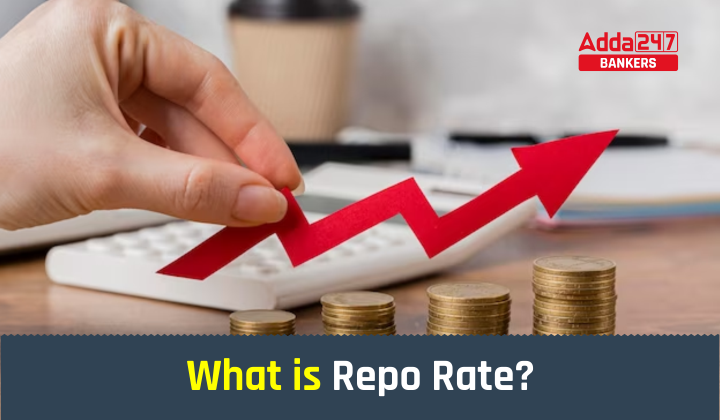Repo Rate
We are providing you with an article on the topic of Repo Rate which you can use as study notes. In this article, we will be discussing one of the most commonly used banking terms that are Repo rate.
“The repo rate is the interest rate at which central banks lend money to commercial banks for a Limited duration, Typically overnight, and is known as the repo rate, short for repurchase rate. It is a crucial tool that central banks employ to manage the money supply in the economy and enforce monetary policy.”
What is the Repo Rate and Reverse Repo Rate?
| Repo rate | Reverse Repo rate |
| The repo rate is the rate at which RBI lends money to commercial banks. | The reverse Repo rate is the rate at which RBI borrows money from commercial banks. |
| It is always higher than the reverse repo rate | It is kept at a lower rate than the repo rate |
| It is used to control inflation and deficiency of funds | It is used to manage cash flow |
| It involves the sale of securities that would be repurchased in the future. | It involves the transfer of money from one account to another. |
| Current Repo Rate: 6.5% | Current Reverse Repo Rate: 3.35% |
Let us Understand better with an example:
Suppose you have 100 rupees and your friend has asked for 150 and promised to give you interest. Now, you probably would get the extra 50 rupees from your parents to meet the demand of your friend and lend it to him. Your parents will be happy to give you the extra needed amount as they will be gaining some extra money. This is exactly how it works in banks on a larger scale. Where the bank(you) lends money to its customers (your friend) by borrowing money from RBI (Your parents), if there is some shortage of money.
The repo rate instrument is also used to control Inflation by RBI. Whenever there is excess money in the market, RBI will increase the repo rate to absorb that extra money and control inflation.
How Does Repo Rate Function?
Banks themselves pay interest when they borrow money from central banks, such as the Reserve Bank of India (RBI), just as you do when you borrow money from them. The repo rate is the interest rate that the central bank charges on loans to commercial banks. This aids in limiting the market’s money flow. The Reserve Bank of India raises the repo rate when inflation hits the market (RBI).
What is the Current Repo Rate?
On February 6, 2024, the RBI held its first Monetary Policy Committee (MPC) meeting of the year. The RBI Governor Shaktikanta Das is leading the six-member, three-day MPC. The SBI research paper states that the RBI’s future policy will continue to take a pause approach. The market’s hopes for a quick switch to rate reductions seem to have been dampened by strong US non-farm payroll numbers and wages.
On February 8, 2023, the RBI raised the repo rate by 25 basis points (bps), to 6.50 percent. Remember that a basis point is equivalent to one-hundredth of a percentage point.
How are Repo Rates and Home Loans Related to Each Other?
The repo rate affects a borrower’s home loan and monthly installment payment. Commercial bank interest rates fluctuate in tandem with the central bank’s adjustments to the repo rate. When banks raise their interest rates, a rise in the repo rate will result in higher home loan interest payments. This suggests that the borrower’s payment will be higher than it was previously. Conversely, banks must lower their interest rates in response to a decrease in the repo rate by the RBI. This suggests that the client will have a lighter payback burden.
Reverse Repo Rate
The reverse repo rate is the rate at which commercial banks lend money to the Reserve Bank Of India. We can also consider that the Reverse repo rate is just an instrument through which RBI parks the excess money deposit with the commercial bank itself. The reverse repo rate is always low as compared to the repo rate to discourage banks from parking their amount in RBI, instead, the goal of the commercial bank as directed by RBI should be to lend as many loans as possible to maximize the profit and also for the development of the Priority sector.



 Weekly Current Affairs One Liners 23rd t...
Weekly Current Affairs One Liners 23rd t...
 CSIR CRRI Typing Test 2025 Date for JSA ...
CSIR CRRI Typing Test 2025 Date for JSA ...
 Can Final Year Students Apply for SBI PO...
Can Final Year Students Apply for SBI PO...


